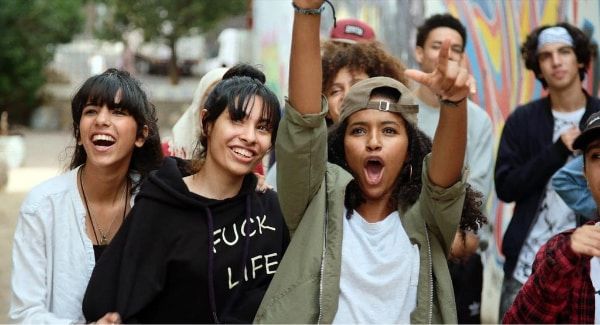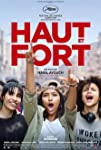Eye For Film >> Movies >> Casablanca Beats (2021) Film Review
Casablanca Beats
Reviewed by: Amber Wilkinson

Hip-hop, dance and youthful revolt are a long-standing collaboration in cinema, in everything from Hustle & Flow to Patti Cake$ and any number of dance-driven films, the latest from French-Moroccan director Nabil Ayouch is the latest to take up the beat. His quasi-musical follows a new teacher at an arts centre in the neighbourhood of Sidi Moumen in Casablanca, who we can see from the massive spray paint word "Vibes" he paints on the music room wall - much to the administrator's disgust - is not a person who likes to follow the rules.
The centre itself is a real place and the youngsters we meet there are non-professionals playing versions of themselves, while the teacher, Anas is played by Anas Bousas, who did, indeed, come to teach at that school having had a rap career. This closeness to real-life gives the film an honest and naturalistic energy, although the backstory of the characters could use a lot more fleshing out.
The kids are a smart and talented bunch, with Ismail (Ismail Adoub) - the standout of the ensemble class - offering sweetly worked vocals and whip-smart chat, another kid beatboxing his heart out, while the girls find it harder to work up courage thanks to the inequalities they face elsewhere. What Anas is really teaching them is less about poetry and more about attitude, as the kids gradually bring their thoughts to the floor through their songs - more of these would have been welcome as the film has a tendency towards the 'talky' in places. Although the heartfelt nature of the film is evident, it's a shame Ayouch became so wedded to its documentary element when its more stylised moments are where it finds its real energy. This is where it dances somewhere close to the energy of Carlos López Estrada's Blindspotting, merging the real with the rap. There's a terrific solo rooftop dance, a sister dressing down her brother by spitting her rhymes at him, and another joyous moment where a group of girls dance while a woman tries to make her way down the street.
Ayouch's film is intended to be celebratory, right down to its "Captain, oh my Captain" moment near its end and, as such, there's a sense he doesn't want to dwell on the negatives the kids face elsewhere in their lives, which is perhaps why much of these moments feel almost like half-finished asides - if you're looking for a grittier look at religion in conflict with the arts, try Papicha or Ghosts. Anas, too, remains a closed book, although the kids' contagious, open energy offers considerable compensation.
Reviewed on: 09 Mar 2022
















